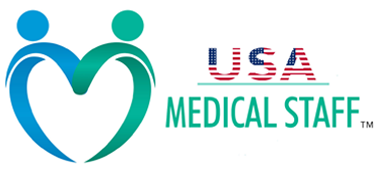Medical & Healthcare Job Resume Tips
Are you looking for a new medical job or healthcare job? USA Medical Staff has you covered.
Whether you’re a Registered Nurse, a Clinical Psychologist, or a Treatment Counselor, your resume is the first thing that any potential employee is going to judge you on. If you’re applying for a competitive role and want to even make it off the starting posts, then you’ve got to lead with a strong resume.
Employers want to see more than just experience and qualifications; they want to see strong professional passions, nursing philosophies, accomplishments, and personal qualities (think compassionate, hands-on, methodical, and diplomatic). You need to be concise, engaging and demonstrate your clinical skills, interpersonal skills, and how you treat patients and colleagues respectfully.
Whether you’re a Registered Nurse, a clinical psychologist, or a treatment counsellor, we’ve
got some handy tips to help you get the most out of your resume writing process.
1. Tailor your resume to the role you want
A generic resume is always the best starting point. This will give you a template that you can modify and adapt. Ensure you look at the job description for the role you’re applying to, and link demonstrable experience to requirements and responsibilities. Highlight relevant patient demographics, policies and procedures, settings you’ve worked in, medications you’ve administered, EMR/EHR used, and equipment experience.
2. Highlight your personal qualities
Personal qualities can often make the difference between two candidates with the same background and experience. Are you a dedicated patient advocate, or an expert multitasker? If you think you’re more emphatic, personable, or efficient then be sure to link your personal qualities to examples, or provide context.
3. Lead with a strong opening statement
Your personal statement needs to succinctly capture your most poignant and relevant career highlights. Pick out your best bits – length of service, specialists, your highest qualification – and, try and keep it to 4 sentences max. “Registered Nurse with over 10 years experience in delivering quality care to patients. Professional, and adept in triage, post-surgical recovery, and emergency room care. Holder of an active Washington State Nursing License.”
4. Don’t be afraid to include non-healthcare roles
Sometimes roles within a non-healthcare setting can help you demonstrate transferable skills that would be great for your new role. Store management experience, for example, maybe relevant to a clinical team leader post as it demonstrates your ability to manage lower grade nursing staff, or healthcare assistants. Make sure you emphasise the elements of the role that would be most applicable and omit anything that isn’t relevant.
5. Handling limited experience
If you’re recently qualified, putting together a resume may seem like a bit of a daunting task. But, you can still demonstrate your aptitude to do your job without having reams of experience. To stand out from the crowd you need to highlight how you’ve gone the extra mile, and voluntary work, self-initiated study, workshops or short courses are all great ways to demonstrate this “During my studies, I have completed self-initiated studies in areas such as venepuncture, IV therapy, and catheter care”
6. Squeezing it all in
If you’ve worked in a healthcare role for a long time, you may find it tricky to figure out how to condense that experience into two pages. For starters, if you’ve been qualified for a long time, then omit your school education. Leave reference details off, and substitute with a brief statement outlining that these can be provided at a later date. And lastly, condense or group experience that took place a long time ago “Prior to 2012: Held a variety of different roles within paediatrics, surgical, and ER
acquiring skills such as …”
7. Highlight relevant hobbies and interests
If you have space, hobbies and interests are a great way to demonstrate personal qualities and skills. If you have an interest in neurology or psychology, then reading books by Oliver Sacks or Carolyn Kaufman demonstrate a deeper interest in your subject matter. Marathon running will show that you’re driven, and regimented. If you’re interested in a role in geriatrics, then volunteering in your local nursing home shows compassion for the elderly. Include any articles published in medical journals, or care in the community.
8. How to change medical professions
You may have extensive experience as a Registered Nurse in Basic Life Support, but have a desire to move into Mental Health. Transferable skills are most important here. Try and match skills in your existing roles, to the requirements set out in the job description. Collaborating with physicians, case managers, and families, and developing care plans are good examples of transferable skills. Make sure you do your homework. Extra knowledge in your new area gained through reading, workshops, study days or voluntary work will always reflect positively and really show that you have thought about your transition.
9. List nursing credentials correctly
If you’ve undertaken extensive examinations and professional courses then understanding how to present them can be confusing. The American Nurses Credentialing Center (AACN) is a good reference point. According to the AACN it’s preferred to lead with your Highest educational degree, followed by Licensure credentials (include RN, LPN and CNA), State designations, and then National Certification.
10. Ask a professional to proofread
Lastly, don’t forget to ask someone with healthcare experience to proofread your resume. A powerful, well-crafted, professional resume will help you stand out among the other candidates and get you through to the next round of consideration.


